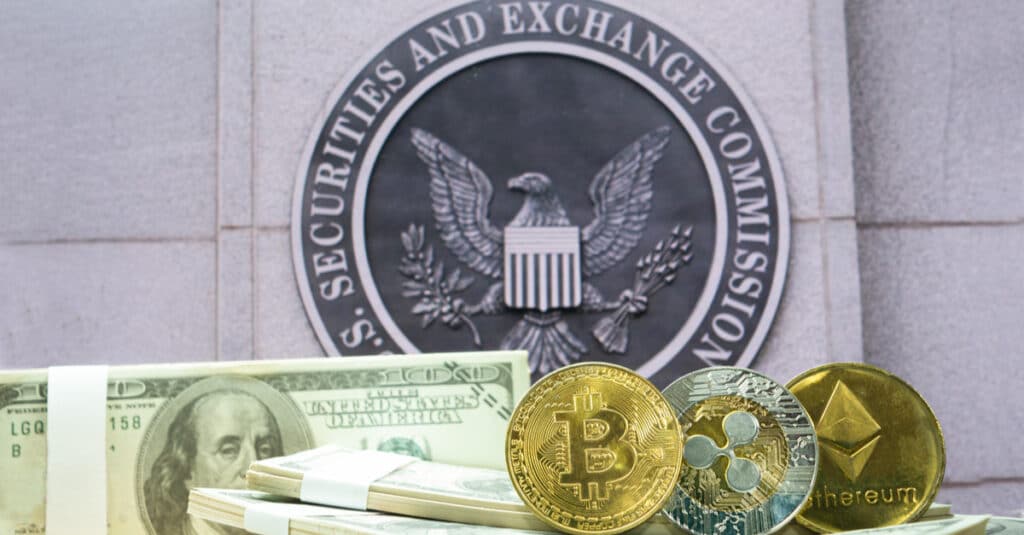If you’ve been following the world of cryptocurrency over the past few years, you may have heard the terms blockchain law and cryptocurrency law thrown around in articles, blogs, and news headlines. But what exactly do they mean? Blockchain and cryptocurrency law are relatively new legal topics that are still being formed and debated by lawyers, lawmakers, and technology experts around the world. That makes it hard to know how to interpret these terms or even whether there really is such a thing as blockchain or cryptocurrency law at all. With the current environment and the SEC v Ripple case, regarding the XRP lawsuit — many are still wondering whether cryptocurrencies are deemed securities or not.
History of Blockchain & Cryptocurrency
Blockchain technology is relatively new, and its legal implications are not yet well understood. Satoshi Nakamoto first published a white paper on bitcoin in 2008, but it wasn’t until 2013 that blockchain technology began to enter mainstream consciousness.
Since then, thousands of people have offered their own takes on what blockchain means for law and society. Some say blockchain will revolutionize contract law or dramatically increase shareholder value through democratized board elections.
Others believe that cryptocurrencies are nothing more than digital tulips. They believe there will inevitably crash in value because they lack any intrinsic worth. Still, others fear that blockchain technology could be used to undermine international law. Additionally, they argue it can increase cybercrime by allowing for anonymous transactions and attacks on government databases.
While it’s still too early to tell whether or not blockchain technology will have a lasting impact on society, lawyers around the world may spend years trying to sort out how it affects everything from real estate records to corporate governance.
The U.S. Government & Cryptocurrencies & Blockchain Technology
And yet, within the United States, most of the focus of state and federal governments has been at the administrative and agency level.
The SEC has carried out enforcement actions and this has implications for the entire blockchain and cryptocurrency industry. For example, the Ripple vs SEC case is one of the largest cases, and it has had a major impact.
Rather than just the SEC, many other agencies, including the IRS, the Office of the Comptroller of the Currency (OCC), Financial Crimes Enforcement Network (FinCen), and the U.S. Treasury may have key roles in crypto regulation in the U.S. Proponents and opponents have emerged on both sides of the coin.
Nevertheless, there are many policymakers and agencies that praise the technology and how important it is to future innovation and U.S. infrastructure.
Furthermore, state governments have also had an active role in cryptocurrency legislation. The majority of this action has been taking place at the state legislative level.
State Governments & Cryptocurrencies
So far, at the state level, we’ve seen two approaches to regulation. On the one hand, some states are trying to drive the adoption of blockchain technology by passing laws that apply favorable regulations to cryptocurrencies. In turn, that may exempt cryptocurrencies from state securities laws and, or from money transmission statutes.
Some states might employ the investment in blockchain technology in an attempt to stimulate their economic growth.
On the other hand, there are states that have passed laws and bills that are more restrictive on cryptocurrencies and blockchain technology.
For example, here are some state legislations for New York:
AB 3099 and SB 5643 create the office of financial resilience. The office would be tasked with implementing new programs and initiatives to support local economies and promote resilient financial models.
A task force established by AB 3860 and SB 5042 in New York will study the impact of a state-issued cryptocurrency on the state.

Cryptocurrencies & Securities Law
When it comes to securities laws, cryptocurrency laws go hand in hand. The SEC generally has regulatory authority over the issuance or resale of any token or other digital asset that constitutes a security. Under U.S. law, a security includes “an investment contract,” which has been defined by the U.S. Supreme Court as an investment of money in a common enterprise with a reasonable expectation of profits to be derived from the entrepreneurial or managerial efforts of others.
This law came about in the 1940s and it’s now known as The Howey Test — named after W.J. Howey Co. and the SEC case. For the most part, the SEC has been clear on its position that even if a token issued an initial coin offering (ICO) has utility, the token will still be deemed to be a security. Consequently, the security is regulated under the Securities Act if it meets elements of the Howey Test.
Why The SEC’s 2018 Testimony Matters For Cryptocurrencies
On February 6, 2018, in written testimony to the U.S. Senate Banking Committee, the Chairman of the SEC noted, Certain market professionals have attempted to highlight the utility or voucher-like characteristics of their proposed ICOs. He added the intention was to claim that their proposed tokens or coins are not securities.
Many of these assertions that the Federal securities laws do not apply to a particular ICO appear to elevate form over substance. It is troubling that many new cryptocurrencies use form-based arguments that divest investors of mandatory protections in violation of security law. For example, merely calling a token a utility token or structuring it to provide some utility does not prevent the token from becoming a security.
William Hinman, Director of Corporate Finance for the SEC, mentioned in 2018 that the tokens being sold are not securities because just like orange groves in the Howey case were not securities. Consequently, tokens, by themselves, may not be securities.
How the tokens are being sold, and the reasonable expectations of those who are purchasing them, are important in determining whether they are being sold as securities. For example, the asset can be held and sold in a way that investors have an expectation of making a profit based on other people’s labor and efforts.
Now, there was one interesting note later in the speech. Hinman made it clear that a digital token may initially be sold in a transaction. Consequently, that would make it considered a security. However, it might be later sold as a non-security. This can only occur when the facts and circumstances have changed over time, such that the Howey Test is no longer met.
For example, Ethereum was sold as a security under the Howey Test, according to many. However, it was later deemed a non-security.
Cryptocurrency Legal Enforcement Actions
In recent years, we’ve seen an uptick in cryptocurrency legal cases. After the Biden administration issued a cryptocurrency-related executive order, we may see even more enforcement actions. However, the cryptocurrency and blockchain industry is still a legal grey area for companies. Many have noted there’s been a lack of clarity.
For example, Coinbase CEO Brian Armstrong pointed out that it doesn’t make sense to treat every cryptocurrency the same way. Especially when they all might be different. For example, Bitcoin and Ethereum may be commodities while others may be securities. A stablecoin might be considered a currency.
In October 2020, a federal district court finalized a ruling against Kik relating to its illegal unregistered offer of digital tokens in 2017. The SEC claims this was a violation of U.S. securities laws. As a result, the court ruled that the sale of tokens constitutes investment contracts and are considered securities.
On the other hand, Kik Interactive argued that the private sales were only available to accredited investors. However, the court held that even those sales didn’t qualify for an exemption. The reason: they were part of a single integrated offering. A part of the settlement with Kik was $5 million.

SEC v Ripple Case & What It Means For Blockchain & Cryptocurrency Law
Over two weeks before Clayton issued the lawsuit against Ripple in 2020, former SEC Commissioner Joseph Grundfest told him not to because Ripple had been traded for 7 years. Clayton told Grundfest that if he filed the lawsuit, it would call into question the SEC’s ability to exercise discretion.
Clayton said that by filing the lawsuit, billions of dollars would be lost for XRP investors.
When the suit was filed, it lost $15 billion in market cap. It should be noted that Grundfest has been retained by Ripple. However, that doesn’t negate the validity of what he said.
In 2022, the case was still ongoing. Whatever the outcome, there will be implications on the entire cryptocurrency and blockchain industry.
That being said, this is one case to keep an eye on, even if you don’t hold XRP.
Now, there is one case that involves a lot of the same issues as the Ripple case, the SEC v LBRY.case. This case looks as if it will be decided before the SEC v Ripple case.
As Jeremy Hogan pointed out on Twitter, “The LBRY/Ripple cases will hinge on the ability of the judges to understand that issuance of tokens operating on a decentralized ledger is NOT just another way of raising funds and does NOT implicate the disclosure requirements underpinning the reasoning behind securities’ laws.”
That being said, this is another major case to keep an eye on.
Closing Remarks: Blockchain & Cryptocurrency Law
Many experts argue they don’t know what to make of blockchain and cryptocurrency law. And, that’s for a good reason — it may be too early to tell. The technology is still evolving at a rapid pace. Regulations are being formed (or are yet to be formed), and best practices haven’t been formulated.
The smartest way to handle blockchain & cryptocurrency law is simply to pay attention to regulations, laws, and enforcement actions. While we may not know where we stand in 2022 in terms of regulations, one thing’s for sure — it’ll be interesting to see how things develop.
That said, make sure you stay up to the latest updates on cryptocurrency and blockchain laws with Legal Favor. We’ll be covering the SEC v Ripple case very closely — stay tuned for updates.





